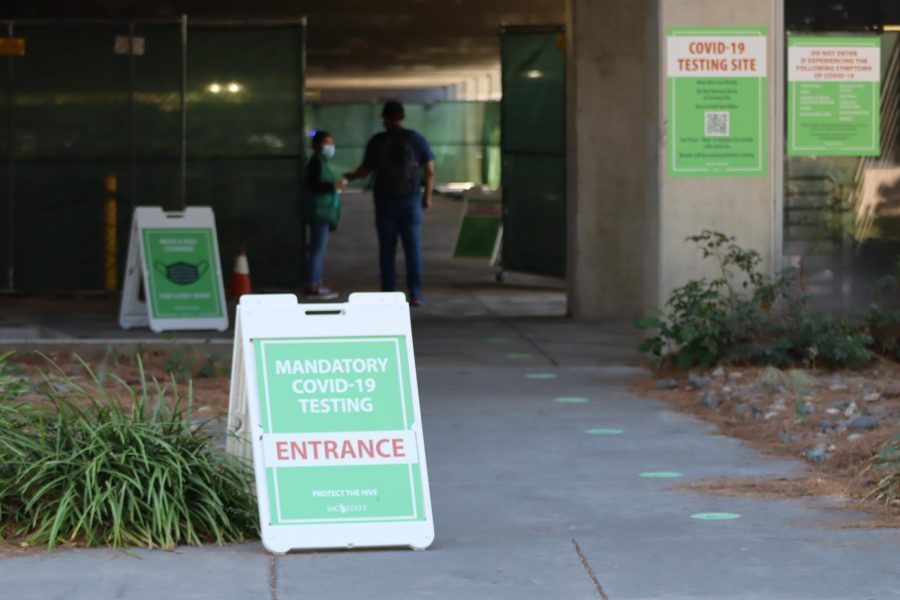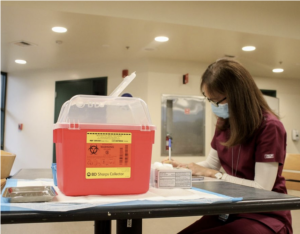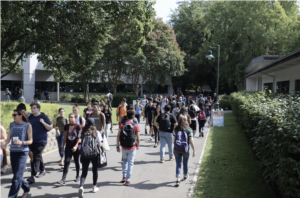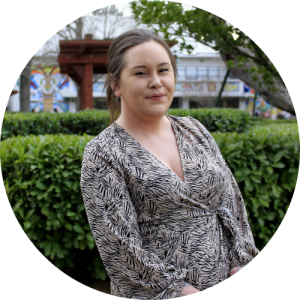Sac State students not required to report positive off campus COVID-19 tests
96% of students accessing campus are fully vaccinated
Sacramento State students with exemptions to the COVID-19 vaccine requirement test for COVID-19 at the testing site in parking structure III across from The WELL on Sept. 30, 2021. All Sac State students are able to test at the site using their OneCard.
November 1, 2021
Sacramento State students are not required to notify the school if they test positive for COVID-19 off campus or outside of the campus’ mandatory testing, according to Student Health and Counseling Services and Academic Affairs.
Additionally, faculty and students may or may not be notified of a positive result that was possibly in contact with them depending on a risk assessment.
In an email to The State Hornet, Associate Vice President of SHCS Joy Stewart-James said that they “ask” that all students notify them of a positive result.
“We recommend that students do report so that we can provide them with guidance and medical support,” Stewart-James wrote.
Provost and Vice President of Academic Affairs Steve Perez said in an email to The State Hornet that they would like to know if students test positive so they can share information with them and to assess the risk to campus.
“We do want students to report to the Student Health and Counseling Center if they test positive whether they are tested on or off campus and coming to in-person classes or not,” Perez said in the email.
He said students are asked to fill out a form to report to SHCS that they have tested positive for COVID-19.
Stewart-James said a risk assessment is conducted for every positive case reported and includes but is not limited to:
- Timeliness of report
- Infectious period
- Physical distancing
- Type and duration of interaction
- Repeated and cumulative interactions
- Indoor versus outdoor environment
- Use of face coverings
- Vaccinations status of contacts
- Judgment of the case investigator
“Faculty and students may be notified of a potential exposure in an in-person class if it is warranted from the risk assessment,” Stewart-James said. “The notification provides guidance but does not include any names or [personal health information].”
Although it is possible that not all positive COVID-19 cases are being reported to the school and also possible that positive cases are not being shared by SHCS to faculty and students depending on the results of a risk assessment, Vice President of Student Affairs Ed Mills said that students are safer on campus than out in the community, as 96% of students who are accessing campus as of Sept. 27 are fully vaccinated.
“Those percentages are substantially higher than the general community,” Mills said.
Mills also said that the school’s testing protocol is also keeping the campus safe.
The protocol includes requiring students with exemptions to the vaccine requirement to test twice weekly, performing a risk assessment for each individual situation and notifying faculty and students if they are deemed to be at risk of exposure and offering them testing.
“The number of positive cases where students have been on campus is extremely low,” Mills said.
According to Sac State’s coronavirus safety information page, 12 students tested positive for COVID-19 on campus in the week of Oct. 17 to 23.
He also said that while students with exemptions are required to get tested for COVID-19, any student can go to the testing site in parking structure III across from The WELL for a free COVID-19 test if they bring their OneCard regardless of their vaccination status.
Criminal justice major Enaliza Lara tested positive for COVID-19 during midterms of the spring 2021 semester and said she did not know that the school asks students to report that they’ve tested positive.
“I didn’t report it and I would’ve had no idea [how] to report it,” Lara said.
Dr. Michael Mink, department chair and professor of public health, said that the requirements for reporting positive COVID-19 cases is a “tricky situation” because the school has to respect the health record privacy of the students. Mink said he thinks that making sure the university does not violate students’ privacy is the driving factor for how the school is handling the reporting process.
“It is difficult if faculty don’t know what individual students’ status are, but I think in this case we have to put the privacy of the students first,” Mink said. “My understanding is that the university is still taking action to disenroll students who are not in compliance.”
Mink said that if a student is administratively removed from a course, faculty will not know the specific reason for the removal, and he thinks that is the university’s way of trying to protect privacy while also protecting the safety of other students.
“I think it’s the best option,” Mink said. “I can’t really think of anything that kind of balances all those things better.”








































































































































walter yost • Nov 3, 2021 at 11:33 am
This story raises the question: Is respecting student privacy more important than protecting students from a deadly pandemic? I wonder.